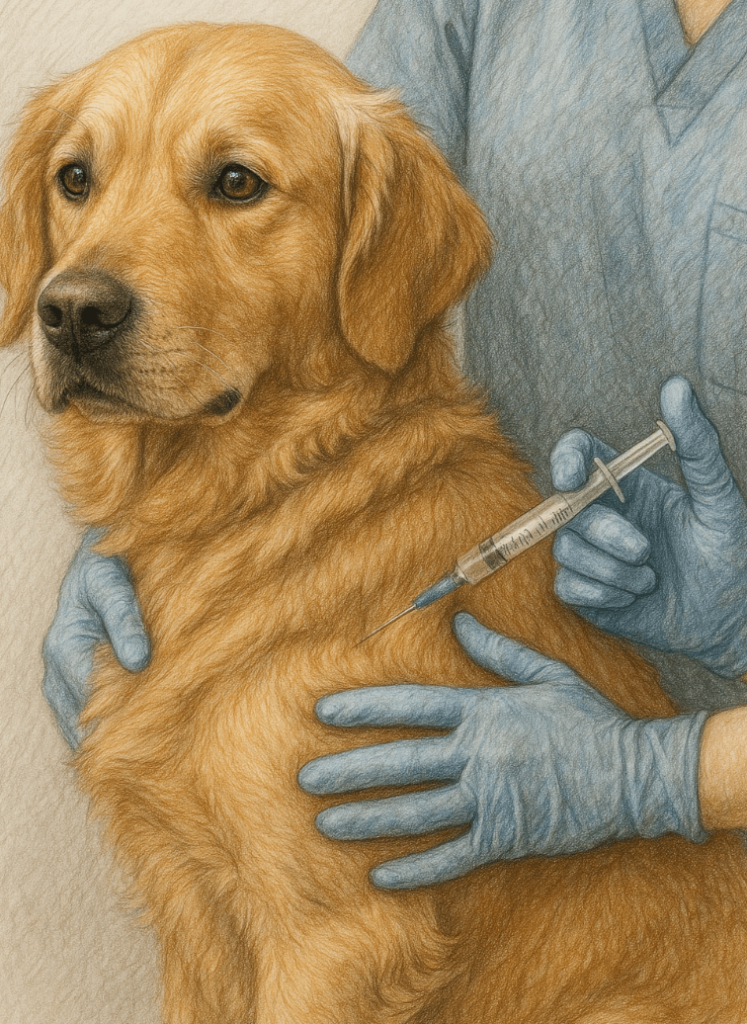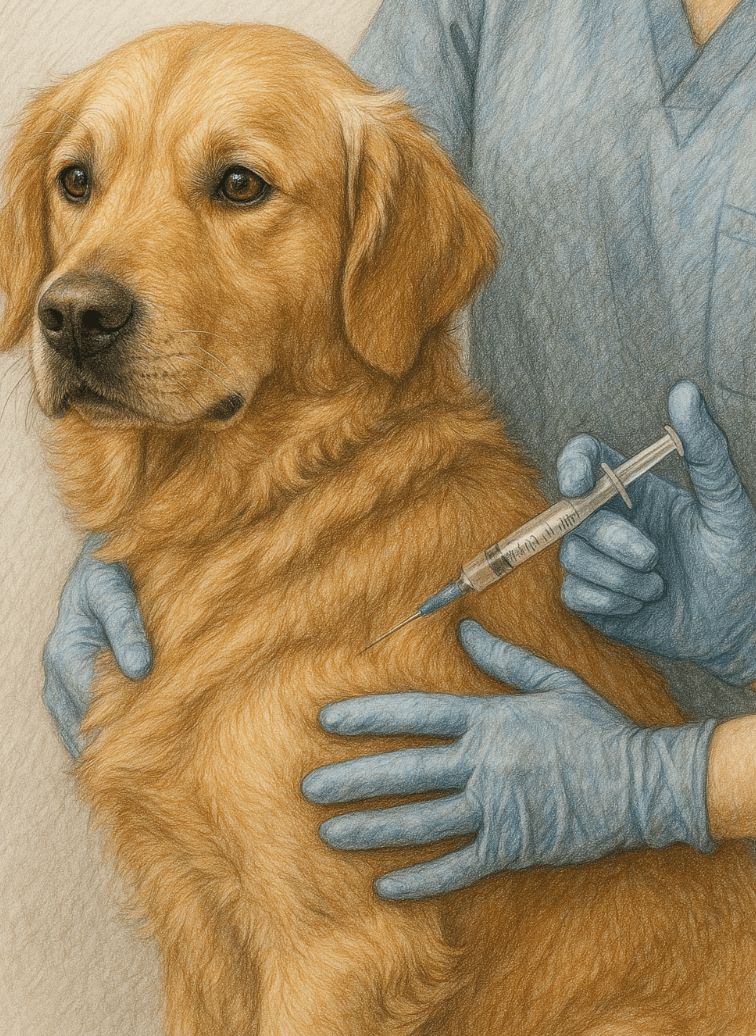Dog Cancer Vaccine: A Promising Breakthrough in Canine Health
Cancer is one of the leading causes of death in dogs, affecting millions of pets worldwide. While traditional treatments like chemotherapy and surgery have been the primary options, advancements in veterinary medicine are paving the way for innovative solutions. One such breakthrough is the dog cancer vaccine, a promising tool designed to prevent or treat certain types of canine cancer. This vaccine offers hope to dog owners seeking effective ways to protect their beloved companions. In this blog post, we’ll explore what the dog cancer vaccine is, how it works, its benefits, and what pet owners need to know before considering it for their furry friends.
Expert Insight by Dr. Samantha Devine
“Many cancers start as smash lumps in the skin, but they can also occur in internal organs and lymph nodes. When a veterinarian examines your dog, they’ll generally check for changes in lymph node size and abdominal organs. You should contact your veterinarian if you notice any lumps or changes in your dog’s weight, energy, or appetite.”
What Is the Dog Cancer Vaccine? Key Facts You Need to Know
The dog cancer vaccine is not a one-size-fits-all solution but rather a targeted approach to managing specific types of cancer in dogs. Understanding its purpose and functionality can help pet owners make informed decisions about their dog’s health.
Targeted Treatment:
Unlike traditional vaccines that prevent infectious diseases, the dog cancer vaccine is designed to stimulate the immune system to recognize and attack cancer cells.Types of Cancers Addressed:
The vaccine primarily targets cancers like osteosarcoma (bone cancer) and lymphoma, which are common and aggressive in dogs.Preventive vs. Therapeutic Use:
Some vaccines aim to prevent cancer development, while others are used therapeutically after a diagnosis to slow tumor growth.Personalized Medicine:
In some cases, the vaccine is tailored to the individual dog’s genetic makeup, enhancing its effectiveness.Ongoing Research:
While the vaccine shows promise, it is still under research and development for broader applications across different cancer types.
The dog cancer vaccine represents a significant step forward in veterinary oncology, offering new hope for dogs and their families.

Benefits of the Dog Cancer Vaccine
The introduction of the dog cancer vaccine has brought several advantages to the field of canine healthcare. These benefits extend beyond just treating cancer, improving overall quality of life for affected dogs.
Enhanced Immune Response:
The vaccine trains the immune system to identify cancer cells as threats, potentially slowing or halting tumor progression.Reduced Reliance on Chemotherapy:
By targeting cancer cells directly, the vaccine may reduce the need for harsh treatments like chemotherapy, minimizing side effects.Improved Survival Rates:
Studies have shown that dogs receiving the vaccine often experience longer survival times compared to traditional treatments alone.Minimized Pain and Discomfort:
For cancers like osteosarcoma, the vaccine can help alleviate pain associated with tumor growth, improving mobility and comfort.Peace of Mind for Owners:
Knowing there’s an additional tool to fight cancer provides emotional relief for pet owners navigating difficult diagnoses.
These benefits highlight why the dog cancer vaccine is becoming an increasingly popular option in veterinary care.
Check this guide 👉Dog Cancer Diet: Best 7 Expert Tips!
Check this guide 👉Understanding Dog Nipple Cancer: Best 7 Expert Tips!
Check this guide 👉Lung Cancer in Dogs: Best 7 Expert Tips!
Advantages of Dog Cancer Vaccines | Considerations Before Proceeding |
|---|---|
Boosts immune response to cancer | Not effective for all cancer types |
Reduces reliance on chemotherapy | May require multiple doses |
Improves survival rates | Cost can be prohibitive for some |
Minimizes pain and discomfort | Availability varies by region |
Tailored to individual needs | Ongoing research needed for efficacy |
How the Dog Cancer Vaccine Works: A Step-by-Step Overview
Understanding the science behind the dog cancer vaccine can demystify its application and reassure pet owners about its safety and efficacy. Here’s a breakdown of how it functions.
Immune System Activation:
The vaccine introduces specific proteins or antigens from cancer cells, prompting the immune system to recognize them as foreign invaders.Customization for Individual Dogs:
In some cases, veterinarians extract tumor samples to create personalized vaccines tailored to the dog’s unique cancer profile.Stimulation of T-Cells:
The vaccine activates T-cells, which are white blood cells responsible for attacking abnormal or infected cells in the body.Memory Cell Formation:
Once activated, the immune system creates memory cells that “remember” the cancer cells, enabling faster responses if the cancer recurs.Monitoring and Follow-Up:
Regular check-ups are essential to assess the vaccine’s effectiveness and adjust treatment plans as needed.
This process underscores the vaccine’s innovative approach to combating cancer at the cellular level.
Potential Risks and Side Effects of the Dog Cancer Vaccine
While the dog cancer vaccine offers many benefits, it’s important to consider potential risks and side effects before proceeding. Being aware of these factors ensures realistic expectations.
Mild Reactions:
Some dogs may experience mild side effects such as swelling or redness at the injection site.Allergic Reactions:
Rarely, dogs may have allergic reactions to vaccine components, requiring immediate veterinary attention.Limited Effectiveness:
The vaccine may not work equally well for all dogs, depending on the type and stage of cancer.Cost Concerns:
The vaccine can be expensive, making it inaccessible for some pet owners without financial planning.Need for Complementary Treatments:
In many cases, the vaccine is most effective when combined with other therapies like surgery or radiation.
Despite these considerations, the vaccine remains a valuable tool in the fight against canine cancer.
Steps to Take Before Considering the Vaccine
Before opting for the dog cancer vaccine, it’s crucial to take specific steps to ensure your dog is a good candidate. These measures help set realistic expectations and prepare for treatment.
Consult Your Veterinarian:
Schedule a detailed consultation to discuss your dog’s diagnosis and whether the vaccine is appropriate.Review Medical History:
Provide your vet with your dog’s complete medical history to identify any contraindications.Undergo Diagnostic Tests:
Bloodwork, imaging, and biopsies may be required to confirm the type and stage of cancer.Explore Financial Options:
Investigate payment plans, insurance coverage, or fundraising options to manage costs.Educate Yourself:
Learn about the vaccine’s mechanism, benefits, and limitations to make an informed decision.
Taking these steps ensures you’re fully prepared to support your dog through this journey.
Alternative Treatments to Complement the Vaccine
While the dog cancer vaccine is a powerful tool, combining it with other treatments can enhance its effectiveness. Here are some complementary therapies to consider.
Surgical Intervention:
Removing tumors surgically can reduce the cancer burden, allowing the vaccine to target remaining cells more effectively.Radiation Therapy:
Radiation can shrink tumors, making them easier for the immune system to combat.Chemotherapy:
When used alongside the vaccine, chemotherapy can address rapidly dividing cancer cells missed by the immune response.Nutritional Support:
A balanced diet rich in antioxidants can boost the immune system and improve recovery outcomes.Pain Management:
Medications or supplements can alleviate discomfort, improving your dog’s quality of life during treatment.
Combining therapies maximizes the chances of success in fighting canine cancer.
Signs That Your Dog May Benefit from the Vaccine
Not every dog with cancer is a candidate for the vaccine, but certain signs indicate it might be worth exploring. Recognizing these indicators can guide discussions with your veterinarian.
Diagnosis of Osteosarcoma:
Dogs diagnosed with bone cancer often benefit significantly from the vaccine due to its targeted action.Recurrent Cancer:
If your dog has experienced cancer remission and relapse, the vaccine may help prevent future occurrences.Strong Immune System:
Dogs with robust immune systems are better equipped to respond positively to the vaccine.Early-Stage Cancer:
The vaccine tends to be more effective when administered early in the disease progression.Lack of Severe Symptoms:
Dogs showing minimal symptoms are ideal candidates, as the vaccine works best when the body isn’t overwhelmed.
Identifying these signs helps determine whether the vaccine aligns with your dog’s needs.
Frequently Asked Questions About the Dog Cancer Vaccine
Is the dog cancer vaccine widely available?
Availability varies by location and veterinary clinic. Consult your vet to determine access in your area.
Can the vaccine cure my dog’s cancer?
The vaccine is not a guaranteed cure but can significantly improve outcomes when used alongside other treatments.
How much does the vaccine cost?
Costs vary widely depending on the type of vaccine and the dog’s condition, ranging from hundreds to thousands of dollars.
Are there age restrictions for the vaccine?
Most vaccines are suitable for adult dogs, but eligibility depends on the dog’s overall health and cancer type.
Does the vaccine replace traditional treatments?
In most cases, the vaccine complements rather than replaces treatments like surgery, chemotherapy, or radiation.
A New Era of Hope for Dogs Battling Cancer
The dog cancer vaccine represents a groundbreaking advancement in veterinary medicine, offering hope to countless families facing the challenges of canine cancer. While it is not a universal solution, its ability to enhance the immune system and improve survival rates makes it a valuable addition to cancer treatment protocols. As research continues, the vaccine’s potential will likely expand, providing even more opportunities to protect our four-legged friends. For now, consulting with a trusted veterinarian is the best way to determine whether the dog cancer vaccine is right for your pet. With love, care, and cutting-edge science, we can give our dogs the longest, happiest lives possible.
Do Cats Have Taste Buds? Best 7 Expert Tips! – Discover how cats experience flavors and why their taste is so unique.
Do Dogs Have Taste Buds? Best 7 Expert Tips! – Discover how dogs experience taste, their preferences, and what it means for their diet and health.
Can Cats Taste Sweet? Best 7 Expert Tips! – Discover why cats can’t taste sweetness, how it affects their diet, and tips to keep them healthy and happy.
Can Dogs Taste Sweet? Best 7 Expert Tips! – Discover how dogs perceive sweetness, which foods are safe, and tips to manage their sweet cravings responsibly.





